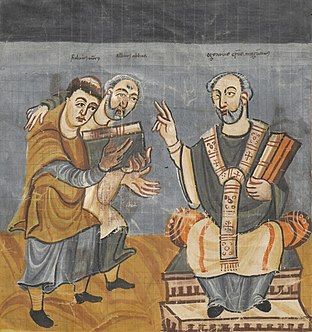 W
WAdelard of Bath was a 12th-century English natural philosopher. He is known both for his original works and for translating many important Arabic and Greek scientific works of astrology, astronomy, philosophy and mathematics into Latin from Arabic versions, which were then introduced to Western Europe. He is known as one of the first to introduce the Arabic numeral system to Europe. He stands at the convergence of three intellectual schools: the traditional learning of French schools, the Greek culture of Southern Italy, and the Arabic science of the East.
 W
WAlcuin of York – also called Ealhwine, Alhwin, or Alchoin – was an English scholar, clergyman, poet, and teacher from York, Northumbria. He was born around 735 and became the student of Archbishop Ecgbert at York. At the invitation of Charlemagne, he became a leading scholar and teacher at the Carolingian court, where he remained a figure in the 780s and 790s. During this period, he perfected Carolingian minuscule, an easily read manuscript hand using a mixture of upper- and lower-case letters. Latin paleography in the eighth century leaves little room for a single origin of the script, and sources contradict his importance as no proof has been found of his direct involvement in the creation of the script. Carolingian minuscule was already in use before Alcuin arrived in Francia. Most likely he was responsible for copying and preserving the script while at the same time restoring the purity of the form.
 W
WRoger Bacon, also known by the scholastic accolade Doctor Mirabilis, was a medieval English philosopher and Franciscan friar who placed considerable emphasis on the study of nature through empiricism. In the early modern era, he was regarded as a wizard and particularly famed for the story of his mechanical or necromantic brazen head. He is sometimes credited as one of the earliest European advocates of the modern scientific method. Bacon applied the empirical method of Ibn al-Haytham (Alhazen) to observations in texts attributed to Aristotle. Bacon discovered the importance of empirical testing when the results he obtained were different than those that would have been predicted by Aristotle.
 W
WThomas Bradwardine was an English cleric, scholar, mathematician, physicist, courtier and, very briefly, Archbishop of Canterbury. As a celebrated scholastic philosopher and doctor of theology, he is often called Doctor Profundus.
 W
WThe Oxford Calculators were a group of 14th-century thinkers, almost all associated with Merton College, Oxford; for this reason they were dubbed "The Merton School". These men took a strikingly logical and mathematical approach to philosophical problems. The key "calculators", writing in the second quarter of the 14th century, were Thomas Bradwardine, William Heytesbury, Richard Swineshead and John Dumbleton. These men built on the slightly earlier work of Walter Burley and Gerard of Brussels.
 W
WJohannes de Sacrobosco, also written Ioannis de Sacro Bosco, was a scholar, monk and astronomer who was a teacher at the University of Paris. He wrote a short introduction to the Hindu-Arabic numeral system which became the most widely read introduction to that subject in the later medieval centuries. He also wrote a short astronomy textbook, Tractatus de Sphaera, which was widely read and influential in Europe during the later medieval centuries as an introduction to astronomy. In his longest and most original book, Sacrobosco correctly described the defects of the then-used Julian calendar, and, three centuries before its implementation, recommended a solution much like the modern Gregorian calendar.
 W
WRichard Swineshead was an English mathematician, logician, and natural philosopher. He was perhaps the greatest of the Oxford Calculators of Merton College, where he was a fellow certainly by 1344 and possibly by 1340. His magnum opus was a series of treatises known as the Liber calculationum, written c. 1350, which earned him the nickname of The Calculator.
 W
WRichard of Wallingford (1292–1336) was an English mathematician, astronomer, horologist, and cleric who made major contributions to astronomy and horology while serving as abbot of St Albans Abbey in Hertfordshire.